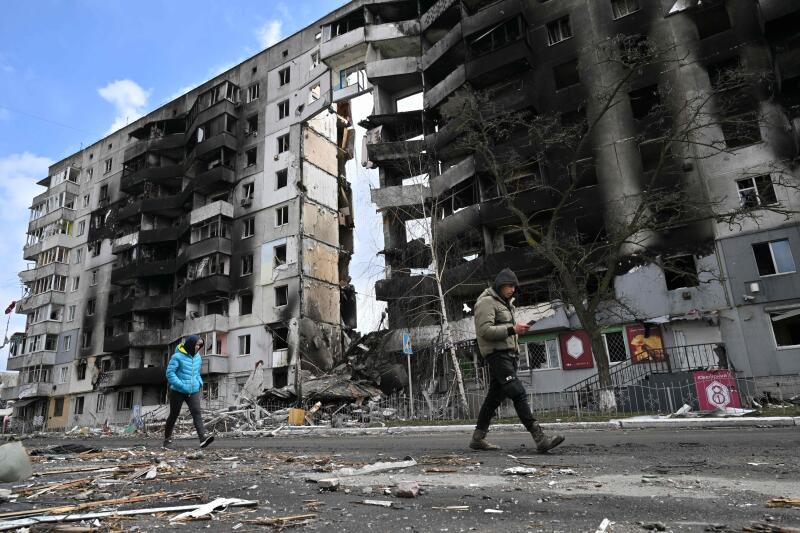The Week In Opinion
S'pore needs to be clear-eyed about security threats; can Vietnam wean itself off Russian arms?
Sign up now: Get ST's newsletters delivered to your inbox

People walk past destroyed buildings in the town of Borodianka, northwest of Kyiv, on April 4. The EU this week announced a fifth round of sanctions as it condemned reported atrocities reported in Ukrainian towns occupied by Russian troops.
PHOTO: AGENCE FRANCE-PRESSE
Follow topic:
It is naive to assume that states are guided by anything beyond self-interest. But it is in the enlightened self-interest of all nations to uphold and reinforce international law and humanitarian principles as the foundation for a more stable and harmonious world order, says Terence Ho, associate professor in practice at the Lee Kuan Yew School of Public Policy.
In his commentary, he notes that while economic sanctions would not be expected to have much impact on a country as isolated as North Korea, the threat of unprecedented sanctions by the West failed to dissuade Russia from invading Ukraine - this despite Russia being a G-20 economy plugged into global networks of trade and investment.
"Small nations must therefore recognise the cold logic of great power competition, and make the necessary military and diplomatic preparations on this basis," he adds.
"This means investing in defence capability and being clear-eyed about geopolitical and security threats. It will not do to put misguided faith in other countries riding to the rescue."
In a world that is in part anarchic and in part rules-based, Prof Ho says it is incumbent on governments and citizens to tilt the balance in favour of order and peace. This means condemning violations of international law and norms in unequivocal terms, and seeking to collectively punish infractions as appropriate.
Can Vietnam wean itself off Russian arms?
Vietnam, as Russia's fifth largest arms importer globally and its largest in South-east Asia, will be the hardest hit by Western sanctions against Russia.
It is imperative for Vietnam to accelerate its diversification of arms imports away from Russia, says Le Hong Hiep, a senior fellow at the ISEAS-Yusof Ishak Institute's regional strategic and political studies programme, in this commentary.
That said, it will not be easy for Vietnam to buy new military equipment from other countries. Vietnam's military modernisation drive has slowed since 2016, and the country's budget for new big-ticket military items seems tight, making weapons from Western countries less affordable for Vietnam.
The compatibility between Soviet/Russian weapon platforms and newer non-Russian platforms will also be a challenge.
As many senior Vietnamese military officials were trained in the Soviet Union and Russia, and have been used to doing business with their Russian counterparts, they may find it difficult to deal with new suppliers who have different business cultures, including more transparent business practices that Vietnamese officials may not be comfortable with.
Nevertheless, relying on a single source of arms will subject Vietnam to serious risks, says Dr Le. "Apart from the above-mentioned issues, Moscow's increasingly close ties with Beijing are another source of risk that Hanoi should be mindful of, given the intensifying South China Sea dispute."
More In Opinion
- Ukraine's future occupies a twilight zone between war and peace.
- What lessons does Ukraine hold for total defence in Singapore?
- Good news for Singaporeans who face criminal charges but cannot afford to hire their own lawyers - a public defender's office, which will be fully funded by the Government, is targeted to start providing legal aid by the year end.
- Hold the salt, please.

